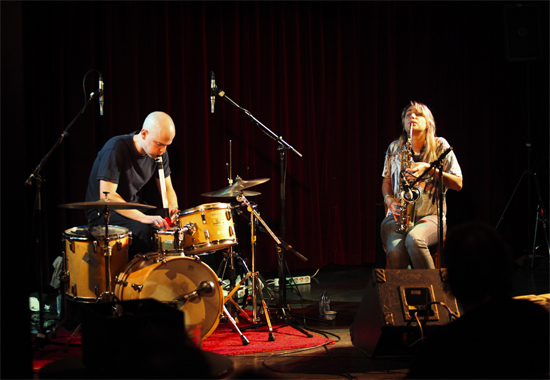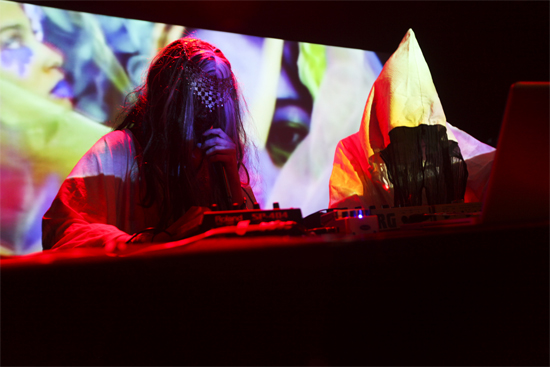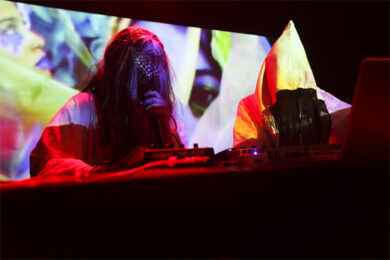Incubate Festival takes place over a whole week in September in Tilburg, in The Netherlands. It’s small and very pretty city, full of beautiful bicycles and dogs and churchbells and apples and so on, but Incubate itself is far from cosy. The musical line-up isn’t self-consciously ‘eclectic’, but genuinely cross-genre, with very little middle-of-the-road indie. There are small spaces for local extreme noise artists and veteran improvisers; big audiences for DJs like Ben UFO and blog-buzz bands like Austra. There is proper metal (Tilburg is also the home of the super-heavy Roadburn Festival). This year there was ‘open source’ visual art that had been curated from an open call to professional and amateur artists in the city. There was also a great deal of well-organised arguing and discussion, and a strong belief in independent culture as an active experience, rather than something we consume. I went for three days of the festival to be on a panel about zines and journalism as part of a day-long conference about DIY. Once that was done I wandered around talking to people, watching bands, looking at stuff and dancing.
Friday 16 September
A long time ago I was on a DIY music panel that seemed like a not-even-thinly disguised excuse for record industry people to talk about how they could make money from Myspace. Today’s isn’t like that at all – and not just because no one talks about Myspace anymore. The panel I am on includes writers from XLR8R, The Wire and Dutch magazine Gonzo (Circus) and the organiser of Roadburn, and our discussion actually feels productive, with astute questions from moderator Atze de Vrieze from Dutch website 3Voor12 (3voor12.vpro.n)
The panel follows author Michael Azerrad’s keynote speech, which exposes some of the problems of talking about ‘DIY’ as it has come to be perceived as an historical movement – of which his 1991 book, Our Band Could Be Your Life, is one of the key texts. Azerrad’s reverence for DIY’s past – in this case, US punk bands – projects a nostalgic mood onto any possible discussion of the current and future state of underground music. Whether this intentional or just the byproduct of having written an era-defining book, it does not feel very useful.
This being Incubate, though, there are more than enough people around with whom I can rant about – I mean, discuss – these issues, and as the day progresses I’m grateful to Azerrad for provoking such good conversation. I go off to find a nice record of Surinamese kawina band music at Sounds, the excellent local record shop, and come back to Bill Drummond, who is a great counterweight to canonical thinking, despite his own status as a underground legend.
Why? It’s hard to explain – maybe, like Azerrad’s US hardcore, you had to be there – not least because Drummond starts with stories from his own past. He wanders around the stage of the Midi Theatre talking about his missionary great-grandfather, and then somehow we’re all singing, each half of the audience a fifth apart, conducted by Drummond and an audience volunteer. We’re now members of ‘The17’, a flexible choir that Drummond says he first imagined from the sounds of his car engine, and has taken as far and wide as Haiti, using poster-sized scores including one that just asks you to wake up un the morning and listen. From this, we’re invited to consider that recorded music is a form of the past, and that, presumably, what we’ve just done is the new year zero – rather than try to find new ways to make preservation pay, he’s arguing for the primacy of the lived, unrecorded experience. Whether there’s something of the missionary in the great-grandson too, or whether it’s just that Drummond’s really good at turning improbability into possibility, the idea at that moment is so convincing that I’m sure I’m not the only audience member this close to forming a spontaneous choir in the streets of Tilburg.
Three excellent male/female duo performances stand out from the evening’s music. Super-prolific drummer Chris Corsano and Lebanese saxophonist Christine Sehnaoui play a restrained, sharp set at Paradox, a small, cocoon-like bar. Corsano’s residency for the festival includes sets with Mick Flower and Mats Gustafsson; tonight he plays to Sehnaoui’s strengths in making her instrument sound alien, almost electronic, by doubling up on some reeds himself and focusing on bowing, scraping and otherwise exploratory techniques on the drums. Sehnaoui is arrestingly physical, emphasising all the ‘invisible’ parts of her technique with loud sucking, spluttering and whooshings of breath, stopping the bell of the sax with her leg in a percussive conversation with the drums. Only on the last of their four pieces do the duo let fly with a soaring passage that fills the red-curtained room.

Over at 013, where I’ll spend the rest of the night going up and down the stairs with my ears ringing, Mater Suspiria Vision are calmly holding a noise séance with robes, veils, sequencers, noise boxes, laptop, and an air of inscrutability matched by the wall of bassy, impenetrable sound they build up over the course of a claustrophobic set. Occasionally beats and vocals emerge, but, unlike the recordings I’ve heard, these are soon refracted and subsumed, drawn back behind the curtain of noise – this draws the attention to the group’s opulent, lushly psychedelic visuals, which have a strong flow and looping motion of their own. The image I’m left with is of a mirror-image woman eating a glowing green light, over and over again, while in front of her the flesh and blood female half of MSV adjusts her veil, her skin and hair painted black and silver like an LARP elf.
Downstairs, Dark Castle’s guitarist Stevie Floyd unpacks a guitar that looks like a goth coffee table then, with drummer Rob Shaffer, unleashes some unexpectedly brutal, ascetic sludge that leaves me keen to check out their album on Profound Lore. A bare-bones lineup like this can be tough for metal bands, but Floyd and Shaffer exploit its strengths: the best tracks are the most minimal, where effects and backing are toned down in favour of rhythmically agile interplay. Floyd can certainly do the death-growl when she sings, but she’s more interesting when in a higher register, keening with a haunting, brittle intensity.
It’s 2am before Yob take to the stage – a trio, not a duo, but who’s counting? In any case, drummer Travis Foster is missing tonight, and Dark Castle’s Rob Shaffer is filling in on drums with, so, well, technically… – anyway, they sound like a whole army of cosmic avatars anyway, like all the best doom. Yob’s music swings and grooves like Om or Sleep at their best, with space for trance-like melody and Mike Scheidt’s epically echoey vocal amid the heft. The band deliver a comprehensive set with a track from new album Atma, the majestic ‘Great Cessation’, and ‘Grasping Air’ from their 2005 debut. It all melds together into the bronzy, warm satisfaction engendered by large, lysergic riffs and beer-drinking, and I am afraid I can’t tell you in what order any of the above happened, except that it was good and I and many others punched holes in the very fabric of the sky with delight.
Saturday 17 September
I wake up feeling a bit sorry for myself and in need of kindred spirits. Fortuitously, at some point the previous night I was given a flyer about a session with Koma Elektronik, a new Berlin-based synth- and effect-building outfit, so I set off with coffee in the hope of bonding with some other analogue nerds.
The Koma people are demoing a new device, a 10-step sequencer and filter, and are happy to let me muck around with it so I wibble contentedly on the Koma gear and a nice modular synth they’ve brought along too, pausing to watch a short performance by a guitarist. Of course, they haven’t just laid this on for hungover geeks to play with, so I should probably direct you to their website, and recommend that if you’re ever in Neukölln, you pay them a visit.
The first show of the day continues to set me to rights. In a warm, quiet theatre space, Baby Dee is at the grand piano, self-deprecating and, as always, devastating. She builds her burlesque cosmology of birds, beasts, gods, bones and teeth with a bright band of young musicians including Trembling Bells’ Alex Neilson and Canadian saw player Doug Tielli and a set including favourites from Safe Inside The Day and recent album Regifted Light. “I just realised my two favourite animals are mortal enemies,” she sighs, of the robins and snails in her songs. “Ain’t that awful?” She shrugs, and her hands dance over the keys again.
If Dee pulls you roughly and affectionately into her world, jazz outsider Charles Gayle emphasizes just how much you’re not part of his, nor he of yours. He shuffles onto the stage, an elderly man in clown shoes, striped beard, battered hat and red clown nose, and it is anything but funny as he conducts a one-man mime show that, after several deliberate false starts, blossoms into beautiful, unfettered fragments of sax and piano. Gayle, who spent many years as a street performer, strikes a note of deep, unequivocal strangeness and discomfort in the calm theatre, and I leave wanting to know and think more about what I’ve just seen.
There’s no time for that, though, as I board the party bus to an open air show by Battles, mooted to be in a ‘forest’, but in fact in a well-managed woodland amphitheatre just out of town. It is a strange spot, spookily lovely, the kind of place you’d see amateur Shakespeare or a posh Satanic ritual like in The Devil Rides Out. It seems an odd location for Battles’ music, associated more with club and studio, but in the five years or so since I last caught a Battles gig, they’ve lost a member and done a lot more touring and now, it seems, have a hardened, pragmatic, slightly precarious edge that works just fine in the sylvan setting, turning it into a kind of clandestine acid laboratory. Ian Williams frenetically doubles up on guitar and keys, John Stanier has set his cymbal even higher and his pulses even more furious, the whole thing is ear-punishingly loud and the much-discussed Gloss Drop live conceit, in which the latest album’s vocal guests appear as videos, is skilfully put together, a virtual Gary Numan and Blonde Redhead’s Kauko Makino pulsing with a pale, awkward energy against the chilly sky. The audience predictably bounces for ‘Atlas’, a song that Battles will never live down, but for my money the newer ‘Ice Cream’, with its cheeky key shifts, makes for better dance moves, although maybe not in a damp amphitheatre.
Once back in town, I go to bed for half an hour and then run out to Midi, where XLR8R are curating the evening, to catch the end of Girl Unit. Rinse FM’s Ben UFO plays a fantastic, sharp, synth-heavy set that feels like a much-needed update, a cumulative flow of knowledge and expertise. I feel a little indignant that, as I approach my mid-thirties, this young guy has made me wish I went raving every week, an idea neither practical nor dignified. Thanks Ben!
And then Theo Parrish turns up and it all goes enjoyably wrong, like messy, good wrong. Peabo Bryson’s ‘Spread Your Wings’, mashed through some quite brutal filters, transforms the room, or maybe that’s just me, in an all-limbs, noise-inflected burst of joy. Parrish’s set seems initially chaotic, then his logic starts to work, and a mood of harsh happiness takes over; people career around the place, bask in fractured disco and chopped-up funk. Too caffeinated and sober to go to bed, I go to the reggaeton night down the road on my own and sit on the stairs watching people dance and smiling like a fool. The Dutch probably think I’m just an English person on drugs, and leave me well alone.

Sunday 18 September
Sunday’s highlight is not EMA, although I wanted it to be and although it is for many others, as Erika Anderson bewitches a packed venue with the sprawling but sturdy American Rock of her 2011 album Past Life Martyred Saints. Perhaps I’m wrong to seek out the strange danger and sadness of Anderson’s previous band Gowns in her new project, and should be celebrating her new strength and self-assuredness – which is cool to watch – but at times it reminds me of the way Patti Smith played the rock dudes at their own game just that bit too much and forgot to leave out the bad bits. The cawing and sawing of ‘Red Star’ is a highlight, though, a reminder of dark roots beneath the new sheen.
Perhaps it’s festival fatigue, but today is more about earlier surprises, like True Champions Ride On Speed, a young math-rock trio from Antwerp who play at lunchtime in the Sounds shop to their friends and some small kids as rain buckets down outside. Their drummer is a blur of energy; their Don Cab-isms fresh and dynamic. Also from Belgium, Flying Horseman are a lesson in how to do melancholy, Bad Seed-ish Spaghetti Western music without sounding too slavishly Cave-worshipping. The six-piece group, led by Bert Dockx, perform a slow-burning afternoon set of brooding and grooving country-noir songs that build to shivery peaks, aided by backing vocalists Loesje and Martha Maieu.
They provide a suitably downbeat introduction to Alexander Tucker, whose solo set follows directly after. When Tucker performs songs from his last album Dorwytch with no guitar, cello or band, and just a table of pedals and gadgets, the melancholy of tracks like ‘Sill’, usually tempered by the rolling folky minimalism of the recording, comes to the fore. Songs are dredged up from drone, polished, and carefully placed back there again like memories.
The mood of spooked psychedelia continues with Amer, not a band but a 2009 French/Italian film that throws Argento-style fetish and slasher tropes in a febrile stew with nods to Bunuel, Lynch and Deren and a superb 1960s/70s-sourced soundtrack. I wonder if Mater Suspiria Vision have come to take notes, but have no idea what they look like without the robes. The film lingers in the mind as I walk back across a deserted, foggy Tilburg early the next morning, despite the best efforts of the Incubate DJs to knock it out of there with Sonic Youth, schlager and whatever else takes their fancy at the festival afterparty.
Photos courtesy of Stu Green/Shot2Bits



